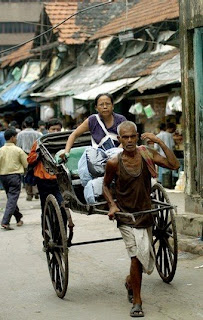When I was in school, whenever a teacher used to see that a student has not done anything not to expectation, he/she used to get annoyed. In most cases, the end result was that the student used to get physical punishment, including slapping and spanking, even before being given a chance to explain. In those days, the situation was no different in homes -- if parents noticed a child doing anything they did not like, many times, they would first beat the child and later ask for explanation. Well, these days, children don't get much physical punishment at then hands of adults when they make a mistake (or the adults feel that the children have made a mistake), still many times, they are not given a chance to explain. I remember a few such incidents from my childhood.
In my primary school, the task of ringing the bell (in fact, banging a hammer on a hanging metal disc) was usually assigned to students. Our teacher used to ask any student to ring the bell, and students used to consider it a privilege and were always waiting for this opportunity. One day during the recess, I was standing near the bell and two teachers were passing by. I felt that one of teacher wanted me to ring the bell, so I ran as fast as I could and used all my power to ring the school bell for the first time in my life. The teachers got annoyed since he did not ask me to ring the bell, so he took me to the Principal's office, and I got severe beating from the school principal -- I was never given an opportunity to explain!
When I was 8 years old, my younger brother, Suresh fell sick, which made him cranky. At night, my mother brought some coins and gave it to him to play with, while I was watching. He kept playing with the coins for sometime. Out of curiosity, I picked up a twenty five paise coin. Next day, I took that coin to my school. During the recess, I showed that coin to my neighbour, Bharati, who was my classmate. Other that admiring the coin and showing it to my classmates, I had no plans for that coin. After the school, Bharati told my mother that I had a coin. On learning this, without asking for any explanation, my mother gave me a severe beating that I still remember. She thought that I had stolen that coin!
I remember another very interesting incident when I had just moved to Grade 6. It was a Sanskrit class and the teacher was a typical pundit who used to wear dhoti-kurta and had a long bodi (बोदी) on his head. So, Guruji was sitting on a chair in a relaxed mood and his bodi (बोदी) was hanging behind the chair. This scene fascinated me, so I told this to Prathivi, the student sitting next to me. Prathavi, instead of enjoying the scene went to Guruji and told what I had told him. However, Guruji thought that Prathivi was telling him that his bodi (बोदी) is hanging behind the chair. Guruji got very angry and started beating Prithivi so badly that the entire scene is still fresh in mind. Prathivi was spared only after Guruji was exhausted. I was lucky that Guruji never gave a chance to Prathivi to explain anything, otherwise I would have received that beating. Prathivi came back to the desk and warned me that he would see me after the school. Prathivi was much bigger and stronger than me, so I had no chance against him in the forthcoming fight. Fortunately, our class room was on the ground floor and the windows did not have any bars. I think you got it. Yes, as soon as the bell rang, while Prathivi was waiting at the door, I jumped out of the window and ran to my house.
Every day, so many incidents take place around us, but we see only what we want to see and listen only what we want to listen. We usually feel that what we see is true and the coin does not have the other side. The children are more vulnerable in this situation to present their point of view. Let us give them a chance. They need encouragement, not beating!
Even in 21st century, school students in many developing countries continue to get beatings from their school teachers for not studying up to their expectations. But, have you heard about a child who was not even a student, yet got beating for not studying! Jhanda Singh was grazing his buffalo near a school. The buffalo entered the school and hit the bicycles. Falling bicycles confused the nuffalo and it stated running all over the school ground and caused more damage. While Jhanda Singh was trying to control the animal, a teacher came out of the class and asked him, "Which class you study in?" Jhanda Singh replied, "Sir, I don't study in any class." Teacher was already angry and now got very mad, and gave Jhanda Singh a good beating. Well, that day, Jhanda Singh took a vow that whatever happens he would ..... If you think that he vowed to go to the school to study, you are wrong. He vowed that whatever happens, he would not let his animal enter the school area.






